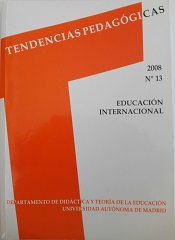Keywords:
Adoption process, international adoption, family training experiences.Copyright (c) 2015 Tendencias Pedagógicas

This work is licensed under a Creative Commons Attribution-NonCommercial 4.0 International License.
Abstract
Adoption has increased extraordinarily in the last few years and has become one of the most common ways of shaping the new family environment. However, and as we shall see in the following pages, out of the two modalities, international adoption is the one that has increased the most. Together with this increase new family demands have appeared. At first they mainly focused on the information of the processes and have now asked for our services. The goal of our work is to emphasise these new demands that go with the pre and post adoption moments and comment on some initiatives in this regard. With the aim of giving a global image, we shall begin by collecting the requirements and phases from the beginning of the process in order to analyse its characteristics. We also want to offer some guidance and family training proposals that are carried out nowadays.Downloads
References
Alberdi, I. (dir.)(1995). Informe sobre la situación de la familia en España. Madrid. Ministerio de Asuntos Sociales
Amorós Martí, P(1987). La adopción y el acogimiento familiar. Madrid. Nancea
Androher, S (2003). “Desafíos del derecho de familia en una sociedad intercultural.”. En D. Borobio (Coord.) (2003). Familia e Interculturalidad. Salamanca.
Publicaciones. Universidad Pontificia de Salamanca.
Bertalanffy. L. von (1962). General System Theory-A Critical Review. General Systems Yearbook. Pág 7.
Brodzinsky, D.M. y Palacios Gonzalez, J. (2005). Psychological issues in Adoption: Research and Practice. Westport. Praeger.
Delgado, M. (1993). “Cambios recientes en el proceso de formación de la familia”.
Miller, J.G. (1978). Living systems. McGraw-Hill. New Cork
Palacios González, J. y Sanchez Sandoval, León Manso, E., Amorós Martí, P., Fuentes
Pelaez, N. y Fuertes, J. (2006). Programa de formación para la adopción internacional. Sevilla. Consejería para la Igualdad y Bienestar Social. Junta de Andalucía.
Palacios González, J. y Sanchez Sandoval, y León Manso, E. (2007). La aventura de la adopción internacional. Los datos y su significado. Barcelona. Fundación Gallifa.
Palacios González, J. y Sanchez Sandoval, y León Manso, E. (2005). Adopción internacional en España: un nuevo país, una nueva vida. Madrid. Ministerio de Trabajo y Asuntos Sociales.
Palacios González, J., y Paniagua, G. (2005). Educación Infantil. Respuesta educativa a la diversidad. Madrid. Alianza Editorial.
Pérez Diaz, V. y otros. (2000). La familia española en el año 2000. Madrid. Visor
Quintana, JM (1993). “Educación familiar” en varios, Diccionario de ciencias de la educación. Madrid. Santillana. Revista Española de Investigaciones Sociológicas. N.64. 123-153pp.
Ríos González, J.L. (1984). Orientación y terapia familiar. Madrid. Instituto de Ciencias del hombre.
Triseliotis, J. (1998). El trabajo en grupo en la adopción y el acogimiento familiar. Ministerio de Trabajo y Asuntos Sociales. Madrid.
www.andeni.org
www.arfacyl.org (Asociación Regional de Familias Adoptantes de Castilla y León, ARFA)
www.galeon.com
www.jcyl.es/servicios-sociales/infancia/adopción internacional
www.madrid.org/servicios sociales/immf/adopoint.htm
www.mtas.es/sgas/Formación/Plan 2006InfFam/
